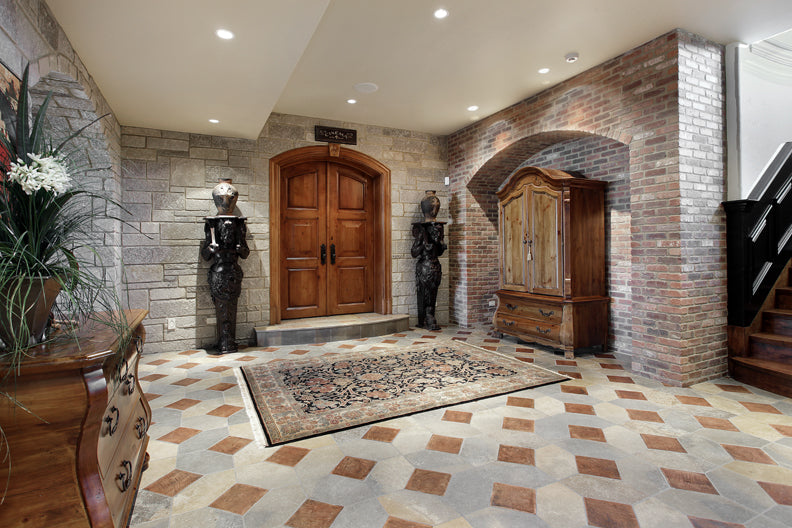
Tile vs Carpet: The Benefits of Each
You're redoing your rooms, and you have to select a flooring material. You have it narrowed down to two options: tile or carpet. Which is better?
Both of these materials have strengths and benefits. The final answer to the tile vs carpet debate may depend on where you're using it, what style you're going for and how long you want it to last. For helpful guidance, take a look at this guide comparing tile and carpet.
Variety
If you're looking for particular shades or patterns for your room, is one material better than the other? Both tile and carpet are available in nearly any color of the rainbow. Designs are more common in tiles, but low-pile carpet sometimes comes in patterned styles.

Floor Mosaic Tile - View Details>>
Installation
While both tile and carpet installation could be considered DIY jobs, these projects are generally best left to professionals, unless you have prior experience installing one of these materials or the other, tile.

Durability
If properly cared for, tile is a material that can serve you well for a lifetime. Some tile floors last for over a century. Of course, tiles can chip, scratch or crack. The good news is that you can often remove the broken piece and replace it with a new one.
On the other hand, carpet's average lifespan is just 10 years. Over time, carpet may become dirty, flat, frayed or faded. Regular cleanings may add a few years, but they can't make it last forever.

Stain Resistance
If you spill red wine or track in mud, will it be easier to clean the mess from carpet or tile? Most carpet quickly soaks up wet or dirty messes. Once they mix with the fibers, it can be difficult to extricate them. Specially treated carpets may withstand stains better, but it will still take some work to get the material clean.
Messes wipe easily from smooth tile floors. With a damp mop, you can typically have your tile looking as good as new. Stains may eventually set into porous tile floors, but sealing tiles and acting quickly to clean up spills can help avoid this trouble.
Maintenance
Carpet should be vacuumed at least once a week. If you have pets or your room sees a lot of traffic, more frequent vacuuming is recommended. Also, deep cleaning — preferably by a professional company — should be done at least once every two years. You'll also need to be on the lookout for snags so you can trim them before they get worse, and it's smart to occasionally adjust the position of your furniture to prevent permanent dents.
It's best to sweep tile floors once a day to keep dirt from being ground into the surface. You can mop weekly. Once a year, you may want to have the tile and grout professionally cleaned. Some tiles may also benefit from occasional sealing.

Warmth
If comfort is a priority, carpet may be a top contender. This material is soft underfoot and feels warmer than many other flooring options. Tile can be hard and cold. That doesn't have to be a dealbreaker though. Some people choose to install underfloor heating systems. Others use throw rugs to add a layer of comfort in certain areas of the room.

Waterjet Mosaics - View Details>>
Water Resistance
Spills will soak right into a carpet floor, and that can lead to mold problems. This is a poor choice for damp rooms like the bathroom or the kitchen. If you decide to carpet one of those rooms anyway, consider laying a water-resistant subfloor, selecting an outdoor carpet and putting down protective mats.
Tile does a much better job of keeping out water. Permeability varies from one style to the next, but many varieties absorb 3% of moisture or less.

Porcelain Waterjet Tile - View Details>>
Traction
Carpet's rougher surface can be beneficial for people with balance or mobility issues. Of course, moisture-prone areas such as the entryway and the bathroom are often the spots where slip-resistance is most important. Since those aren't great places to install carpet, you may do better to choose tiles with a high coefficient of friction rating.

Floor Medallion - View Details>>
Noise Reduction
The absorbent nature of carpet means that it's usually considered the best material for muffling sounds. On the other hand, sound waves are more likely to bounce off smooth tiles. If you are renovating a noisy room, it may be a good idea to lay carpet or install an acoustical system.

Limestone Tile - View Details>>
Allergies
Dust mites and other allergy triggers like to take up residence in carpeting. It can be hard to keep carpet entirely free of allergens. It's not as easy for dust and dander to stick to tile floors, and regular sweeping and mopping can keep loose allergens at bay.

Waterjet Medallion - View Details>>
When weighing the pros and cons of tile vs carpet, tile often wins. This material can be affordable, attractive, long-lasting and versatile. Whether you are outfitting a bathroom, an entryway or a living space, tile can be a beautiful addition to your room.
To discuss whether tile is right for your renovation project, reach out to Artsaics. We look forward to sharing our tile knowledge with you.

